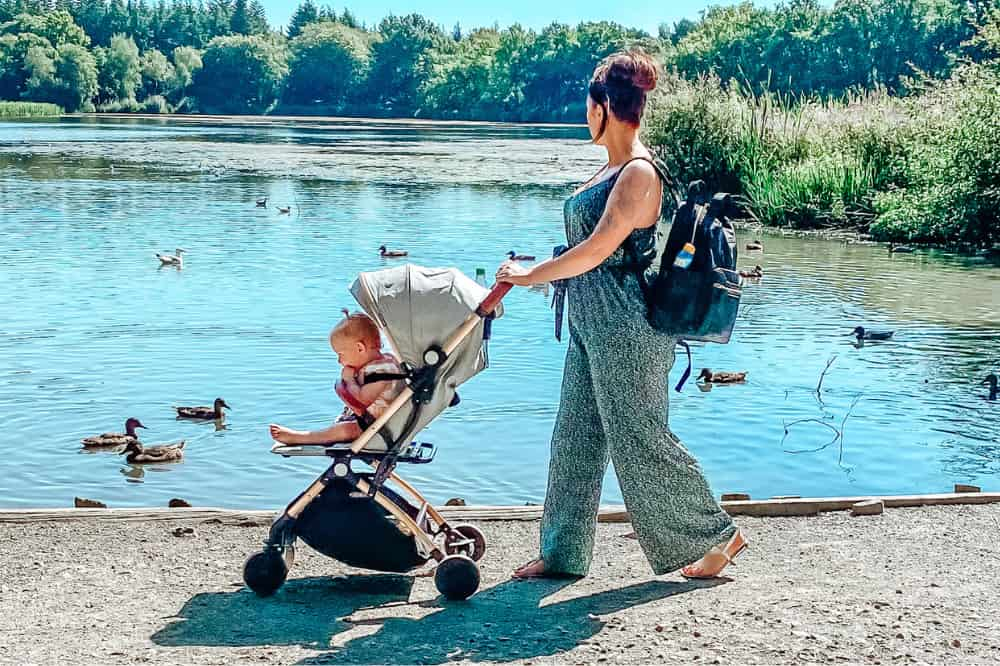Are Baby Strollers Necessary? (Explained)
As new parents navigate the overwhelming world of baby gear, one question frequently arises: Are baby strollers necessary?
In this guide, we’ll explore the pros and cons of baby strollers, alternative options, and factors to consider when making this important decision for your family. By the end of this article, you’ll have a clearer understanding of whether a stroller is a must-have item for your parenting journey.
To help readers understand this better, we decided to share both the pros and cons of the “stroller” argument. It’s important to consider both sides of the issue, and if there’s a special case concerning your baby, consulting a doctor might be the best course of action.
The Case for Baby Strollers

1. Convenience and Mobility
Baby strollers offer unparalleled convenience for parents on the go. They provide a safe and comfortable space for your little one while allowing you to navigate various environments with ease. Whether you’re running errands, taking a walk in the park, or traveling, a stroller can make your outings much more manageable.
According to Babydeals4U, parents should reconsider the idea of strollers being a necessity for their baby. While they offer convenience, they are not always essential for every family. Depending on your lifestyle, you might find that baby carriers or slings are a better option, providing more flexibility and closeness with your baby. Explore all the alternatives and choose what’s best for you and your little one.
2. Storage Capacity
Most modern strollers come equipped with ample storage space, allowing parents to carry diaper bags, snacks, and other essentials without the need for additional bags. This feature is particularly useful for longer outings or when traveling with your baby.
3. Protection from the Elements
Strollers offer protection from sun, wind, and rain, ensuring your baby stays comfortable in various weather conditions. Many models come with adjustable canopies and weather shields, providing a controlled environment for your little one.
4. Long Term Use
While the initial investment in a quality stroller may seem significant, many models are designed to grow with your child. Convertible strollers can adapt from infant to toddler stages, offering potential value for money over time.
The Case Against Baby Strollers
1. Cost
High quality strollers can be expensive, with prices ranging from $100 to over $1000 for premium models. For families on a tight budget, this cost may be difficult to justify, especially when considering other essential baby items.
2. Space Constraints
Strollers can be bulky, taking up significant space in homes, cars, and public transportation. For families living in small apartments or those frequently using public transit, a stroller might pose storage and mobility challenges.
3. Reduced Physical Contact
Some parents prefer methods that allow for more direct physical contact with their baby, believing it may promote bonding and development. Strollers, by design, create a physical separation between parent and child.
4. Terrain Limitations
Not all strollers are suitable for all terrains. Parents living in areas with uneven sidewalks, frequent snow, or who enjoy hiking might find standard strollers impractical for their lifestyle.
Alternatives to Traditional Strollers
1. Babywearing
Babywearing, using carriers or wraps, offers a hands free way to transport your baby while promoting close physical contact. It’s particularly useful for navigating crowded spaces or uneven terrain.
2. Car Seat Carriers
For parents who primarily travel by car, a car seat that clicks into a lightweight frame can be a space saving alternative to a full sized stroller.
3. Wagons
Foldable wagons have gained popularity as a versatile alternative to strollers, especially for families with multiple children or those who frequently visit parks or beaches.
Factors to Consider When Deciding on a Stroller
1. Lifestyle and Environment
Consider your daily activities and living environment. Urban parents might prioritize a compact, lightweight stroller, while suburban families might prefer a more robust model with all terrain capabilities.
2. Family Size and Future Plans
If you’re planning to have more children, investing in a convertible or expandable stroller might be more cost effective in the long run.
3. Baby’s Age and Development
Newborns require different features (like full recline and car seat compatibility) compared to older babies or toddlers. Choose a stroller that suits your child’s current stage and can adapt as they grow.
4. Travel Frequency
Frequent travelers might benefit from a lightweight, easily foldable stroller that meets airline carry on requirements.
5. Physical Considerations
Parents with back problems or other physical limitations might find a stroller essential for transporting their baby comfortably and safely.
Final Thoughts
The necessity of a baby stroller ultimately depends on your unique family situation, lifestyle, and preferences. While strollers offer undeniable convenience and versatility for many parents, they’re not an absolute necessity for everyone.
Consider your specific needs, budget, and the alternatives available before making a decision. Many parents find a combination of stroller use and babywearing to be an effective approach, allowing for flexibility in different situations.
In fact, for quick outings or park visits where a stroller might seem bulky, carrying essentials in a compact, functional bag like the DFresh Insulated Lunch Bag by Damentro can simplify your trips. Its multiple compartments and temperature control keep snacks fresh and drinks cool, ensuring you have everything you need without managing a stroller.
Remember, what works best for your family may differ from others. Trust your instincts, consider your daily needs, and choose the option that aligns with your parenting style. Whether you opt for a stroller or an alternative, the most important factor is ensuring your baby’s comfort, safety, and your ability to enjoy outings together as a family.
